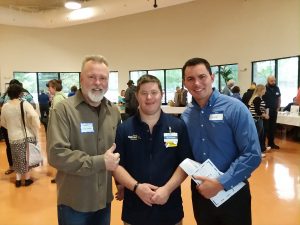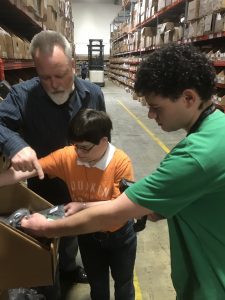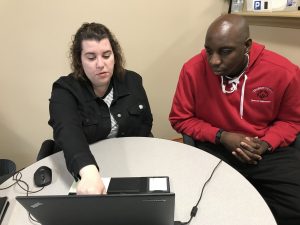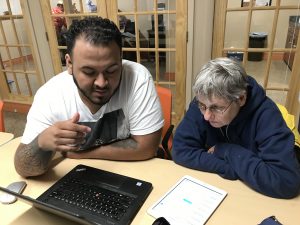At JJslist.com and No Boundaries, we interface with the Search Career Services team quite a bit. We love what they have done for many of our participants and wanted to share their story with our readers. Below is a Q&A with our small, but mighty, Career Services team:
What is CES?
CES Team: Community Employment Services (CES) at Search, Inc assists individuals with disabilities to find gainful, integrated employment in their communities. CES is part of the Career Services department at Search.
CES Employment Specialists provide person-directed services and supports to individuals to choose, achieve, and maintain employment in integrated community employment settings.
Tell us about yourselves:
Robert: I am Search’s Career Services Program Manager. I oversee Community Employment Services (CES) along with other programs in the Career Services department. I have been in this job since August 2015. I focus on building relationships with employers, government entities, and school districts in the local communities so we can help job seekers find meaningful employment.
Sarah: I am an Employment Specialist. I joined the Career Services Team in 2011, but I have worked for Search as a QIDP since 2008. I have a degree in speech communication with a specialty in public relations. I took a certification class when I began in Community Employment Services (CES) through Virginia Commonwealth University. It gave me a wonderful foundation for my job, and helped me understand the various methods used to assist people with disabilities to find integrated work in their communities, as well as historical knowledge on the supported employment movement.
Brandon: I have been an Employment Specialist with CES for about a year and a half. I have a degree in Psychology with a double minor in Sociology and Criminal Justice. I am of Mexican and Puerto Rican descent. My interests include reading, movies, and watching Game of Thrones.
Q: How do you find clients?
CES Team: We get our clients from referrals from various sources: The Illinois Department of Rehabilitative Services (DRS) is our main source for referrals. However, we also get client referrals from high school transition teachers, by attending high school transition or job fairs, internal referrals from other Search departments, and by word of mouth.
Q: Can you explain what DRS is?
CES Team: DRS is an arm under the Illinois Department of Human Services (DHS). It is the state’s lead agency that services people with disabilities and helps them find jobs.
Q: Can you explain why you work with DRS?
Sarah: DRS funds two contracts (Milestones and Supported Employment Program (SEP)) for Search that allow us to serve an allotted number of individuals in job placement services. DRS counselors have such large caseloads of individuals that they often contract out cases to various agencies for job placement services. Search is part of that network of community rehabilitation providers (CRP) that offer employment placement services. Search works with several DRS offices in the Chicagoland area.
Q: What is the difference between the Milestones and SEP contracts?
CES Team: The DRS Supported Employment Contract (SEP) is for individuals with more significant disabilities. It offers a more structured job search process and provides longer-term job coaching and on-the-job-training. This contract typically lasts 24 months and is marked by 8 phases.
The DRS Milestone contract is a short-term contract for individuals with disabilities who are or can quickly become capable of working independently in a competitive job setting. The milestones name comes from the number of days a person has been successfully placed on the job: 15, 45, & 90 days.
Adult service providers, including Search, get paid by DRS for each milestone an individual successfully passes. If a person hits 90 successful days on the job, their case is closed with Search and DRS, and they are expected to work independently from then on.
Individuals who are Medicaid recipients are also open to receive Medicaid Waiver (39U) services, also known as Supported Employment Services. This funding is indefinite, i.e. the individual has on-going job placement and coaching services as long as they are willing and able to work.
Q: Who decides which contract an individual gets?
CES Team: DRS makes the decision based on an individual’s eligibility. This includes a doctor’s diagnosis or school records to support diagnosis of a disability.
Q: What supports to you provide clients?
CES Team: We support our clients in many ways, from the discovery process, resume writing, filling out applications, mock interviewing to on-boarding, hiring and orientation, job coaching, on-the-job training, acting as liaison to human resources, supervisors and managers, and following up.
Q: What do you expect from your clients?
Robert: I expect my clients to be willing to follow established plans of action, punctuality, follow-through on assigned tasks, and best effort on a job once they are hired. I also ask that individuals stay in a position for at least a year before they start looking to move somewhere else.
Sarah: I like to think of the individuals I work with as a team member. It’s a collaborative effort. We’re on the same team with the same goal: finding a job that the individual is excited about and wants to do. I don’t force people into jobs they don’t like, because that does not breed success. Other expectations I have are: bringing their own job ideas; finding job postings they are interested in; keeping appointments; and being organized, or at least trying to be organized.
Brandon: I expect my clients to be involved in the entire process of the job search instead of depending on me to do all the work. It is a team effort, and as a team, we both contribute and put forth effort in finding them employment.
Q: How long do you work with your clients?
CES Team: How long we work with someone depends on the specifications of their contract from DRS and the individuals’ needs. Often we stay in contact with individuals once their case closes, and sometimes they re-open with DRS and us when they’re promoted or want to explore a new job after a year or two. It also helps to stay in contact with employers to ensure we maintain a relationship that hopefully leads to future placements.
Q: Do clients pay anything for your services?
CES Team: No. All of these services are paid through the various funding streams.
Q: Who is your typical client?
CES Team: No client is typical. Everyone we serve is an individual with different needs and backgrounds. Some clients are straight out of high school, some have college degrees, some have experience, some have no experience. The common thread is that we work with adult individuals who have different disabilities.
Q: How long does it take to find a client a job?
CES Team: There are many factors that contribute to the length of time it takes people to find a job: the job market, the client’s experience or lack thereof, a client’s motivation, the type of job the client is interested in, whether we have an established relationship with an employer, where an individual lives. It depends on each individual’s circumstances. Sometimes it takes only a few weeks. When someone chooses to find the “right” job, it may take a year or more.
Q: Who are some of the employers Search works with?
CES Team: Search has been lucky to work with some wonderful businesses, such as Mariano’s, Jewel, Home Depot, Marshalls, and River’s Casino. We have also worked with amazing independent businesses and schools, like Joseph Academy, Old Orchard Jr. High, Threadless, and Lakeview Ace Hardware. We are always looking to form new partnerships within the communities where we work.
Q: What do you like best about your job?
Robert: Seeing people’s lives enhanced/changed and their pride in their new job/career.
Sarah: I love helping individuals grow and become more independent. It’s incredibly satisfying to see people get their first job and really take to it, or to get their dream job. I also love seeing the bonds they form with their co-workers, as well as attaining items they’ve worked hard to earn and are now able to enjoy because they have an income.
It’s a lot of fun to learn new jobs myself and get behind-the-scenes knowledge of places I frequent in my life outside of work.
Perhaps the best part is helping businesses we work with learn how much of an asset our individuals are to their businesses!
Brandon: My favorite part of the job is the moment when a client gets hired. They have worked so hard and are so happy to be able to achieve something so great, compared to others who might take getting a job for granted.
To find out more about Search’s Career Services, please visit our website here or contact Jessica Dentzer, Intake Coordinator, at jdentzer@search-inc.org or 847-789-7155, ext. 291.










No Comments
No comments yet.